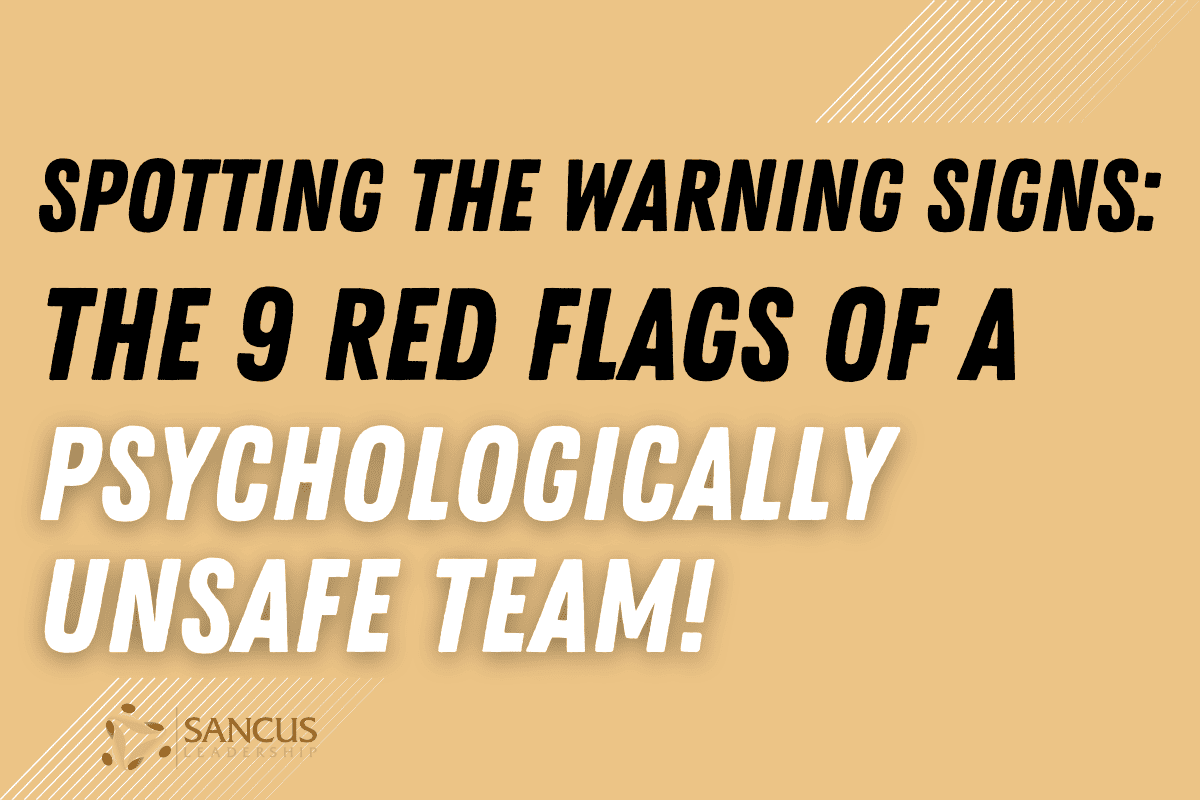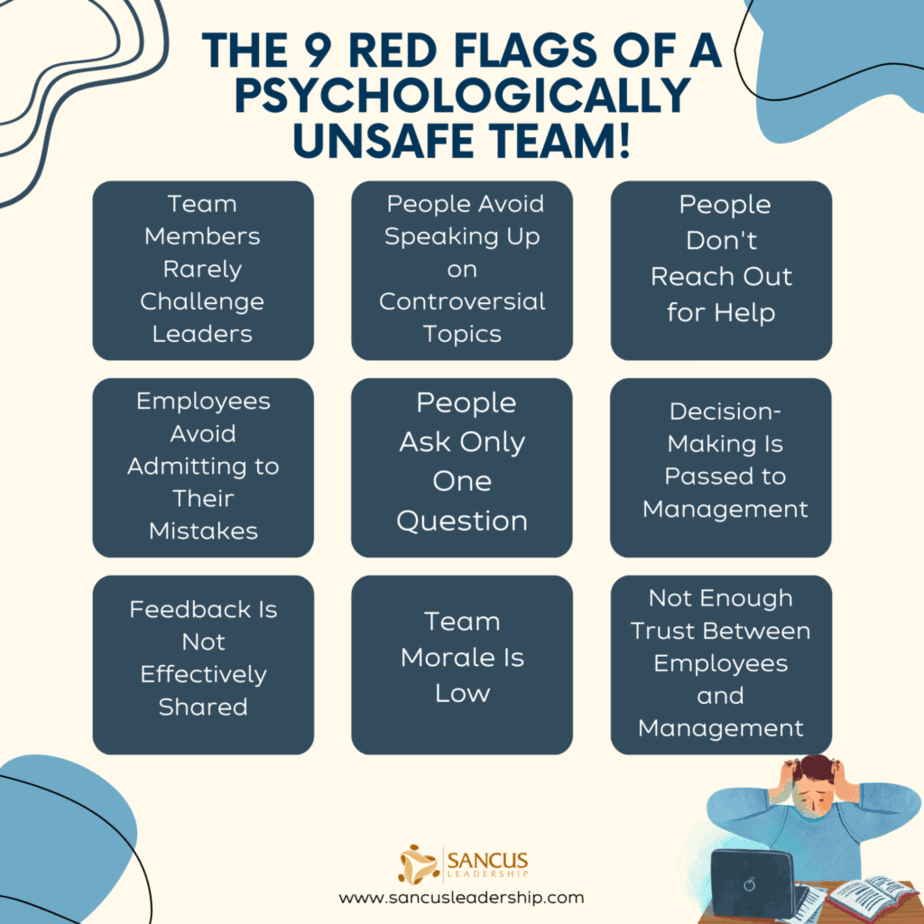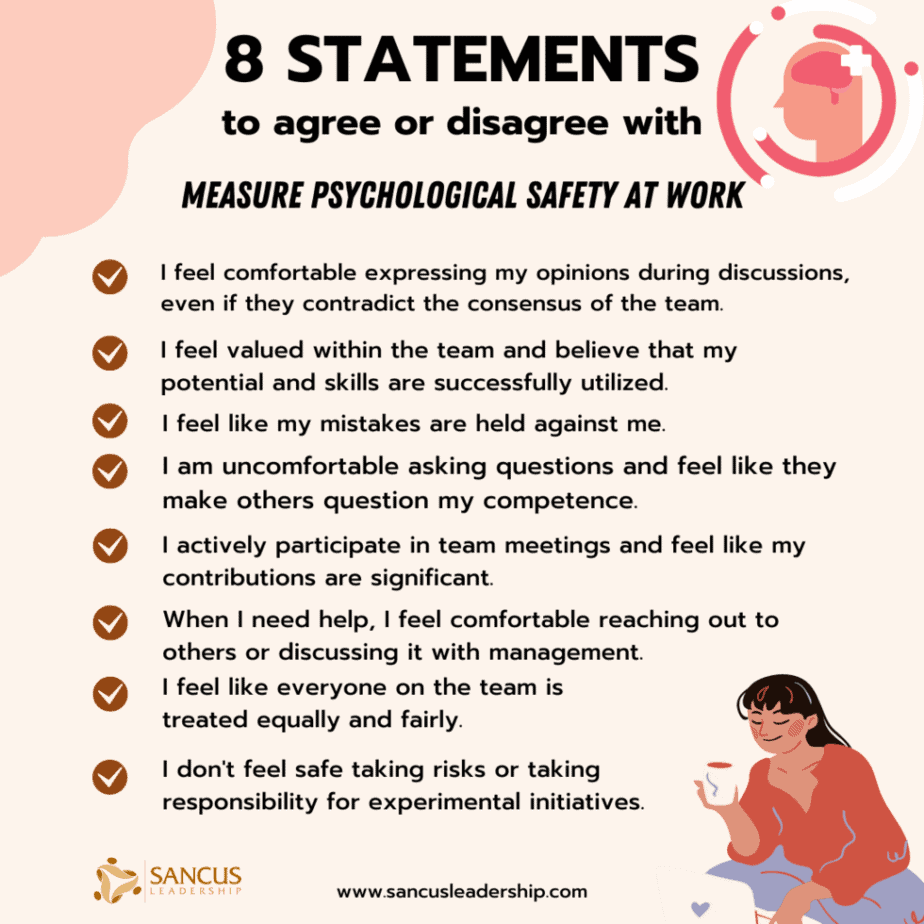Your cart is currently empty!

The 9 Red Flags of a Psychologically Unsafe Team!
If you are a team leader, then you are probably (like me) always on the lookout for new ideas that can solve old problems more effectively. The problem is that many teams lack the necessary level of psychological safety to feel comfortable speaking out about new and bold ideas. So how can you know if psychological safety is an issue at your workplace?
Some common signs of a lack of psychological safety include fear of speaking up against senior management, inability to voice individual concerns or opinions, low team morale, ineffective feedback exchange, and a lack of participation in team activities.
The term psychological safety was new to me until a few years ago. On the teams, we simply called it “having someone’s back.” This meant that whatever stupid thing someone did or said, we knew it came from a place of trying to make things better.
We assumed incompetence instead of malevolence; this made everyone okay with taking risks and screwing up in the hunt for a better way of doing our job. Since then, I have learned more about psychological safety as a science, and it has allowed me to explain how we could be so effective as a team and why we stayed together for so many years, although most teams broke up after a year.
In this article, I’ll explain what may signal that your team doesn’t feel psychologically safe and how to measure emotional safety on your team.
9 Signs Your Team Lacks Psychological Safety

Psychological safety incorporates many things. Feeling free to express yourself and share ideas without fear of judgment, being comfortable raising concerns and voicing opinions even if they contradict the team consensus, and so much more.
Simply put, emotional safety allows employees to be honest and “vulnerable,” experiment and take risks without fear of failure and be comfortable working to their fullest within the team. Naturally, it highly benefits the company, boosting workers’ productivity and encouraging growth and development.
The relationship between leaders and workers, in large part, defines psychological safety. Managing the team wisely and effectively also means ensuring high levels of emotional safety for its members.
So, how do you know if your leading strategy supports or declines employees’ psychological safety? Here are the nine signs that emotional safety is low and needs working on.
If you are unsure if spending time on building psychological safety is right for your team, then check this out: 19(+1) Ways Psychological Safety Impacts Your Business!

1. Team Members Rarely Challenge Leaders
A psychologically safe environment allows employees to voice disagreements professionally without fear. On the other hand, when this aspect of the working environment is missing, they’ll be less willing to disagree, especially with leading and managing team members.
The issue is easy to notice during meetings and discussions that involve management. If team members tend to agree with everything and avoid arguing, it may indicate they don’t feel comfortable voicing their opinions and fear the consequences of challenging leaders.
This limits the team’s opportunities for growth and blocks the way for healthy discussion and constructive debate. Lack of such communication also means fewer opportunities for optimizing the working process.
At your next meeting, count the number of follow-up questions you hear. If there are only one or two follow-up questions, but it’s evident that the person who posed the question isn’t satisfied with the answer, then chances are they don’t feel comfortable enough to get to the bottom of the problem.
Sometimes this is due to time constraints or other reasons that make perfect sense. But often, people stop asking questions because they don’t want to look stupid, or the respondent starts to get frustrated.
This is a clear sign that something needs to be done. You are probably missing out on many great ideas that would propel the business.
Here you can find more indicators of low psychological safety during a meeting.
2. People Avoid Speaking Up on Controversial Topics
Lack of emotional safety also causes people to refrain from controversial opinions and active participation in discussing potentially sensitive topics. Meetings intended to deal with particularly difficult subjects or talk through complex matters may seem hushed, and those who speak up may be hesitant to express a clear and confident opinion.
Employees feel unsafe sharing their points of view and expressing original ideas, fearing the consequences of being wrong. When emotional safety is lacking, workers are more willing to accept what they don’t agree with than take responsibility for individual opinions.
This could also be a result of the TSL effect, which you can read more about here.
The issue is even more noticeable in discussions on controversial topics. As a result, decision-making lacks the perspectives of workers and alternative viewpoints.
For management, it might seem convenient that their suggestions are not challenged. However, leading a team effectively is only possible with the exchange of ideas and communication.
You can test if your team avoids controversial topics by:
- Present an idea you know is provocative to your team (you do not have to agree).
- Temporarily take a stand for something that you believe they will strongly oppose, and
- Watch their reactions. Do they ask questions? Do they respond at all?
- Ensure that when the discussion is done, you declare your honest thoughts and that you want their views on the matter.
I have tried this with my old team as well as on new teams; I use it as an indicator to measure the willingness to engage in constructive conflict and understand how psychologically safe they feel.
3. People Don’t Reach Out for Help
If you notice that your team members don’t ask for help or request workload adjustments even when it’s evident they are struggling with meeting deadlines and completing tasks, this is also a sign of a lack of psychological safety.
This could be a conclusion made from past experiences. It shows that people don’t feel comfortable reaching out to others or seeking aid, likely because they do not expect to receive it. Another reason might be that they are afraid to be judged or receive negative comments about their performance and competence in response.
The lack of support often results in reduced productivity, as the employees get overwhelmed and eventually experience burnout.
More effective team management could have avoided these issues if only workers felt comfortable enough to raise their concerns and admit they require help.
Sometimes the reason why teammates don't reach out for help has nothing to do with psychological safety but rather having an improper-sized team.
4. Employees Avoid Admitting to Their Mistakes
One of the major indicators of a lack of psychological safety is fear of failure. It leads to people being reluctant to admit to their mistakes or even trying to put blame and responsibility on others. Needless to say, this doesn’t create a healthy working environment.
Managing a team where errors are concealed and never properly discussed is difficult and often leads to unnecessary issues that could’ve been avoided with proper communication.
Managing a team where errors are concealed and never properly discussed is difficult and often leads to unnecessary issues that could’ve been avoided with proper communication.
Such issues often arise when people face a lot of pressure, and their mistakes are not met with understanding by team leaders. Even if no mistakes are made, fear of failure is still present, getting in the way of new initiatives, experiments, and risky projects.
When people aren’t emotionally safe to risk being accountable for errors, they tend to stay in the safe space of sticking to their direct responsibilities. You’ll notice them being stressed about getting everything right and finished on time.
You can easily measure your team’s willingness to admit failure by counting how many “confessions” you receive per week. If you have zero per week, then something is definitely off.
My experience tells me that you should be getting at least five confessions per week per employee in a healthy work environment.
My experience tells me that you should be getting at least five confessions per week per employee in a healthy work environment.
And I’m not talking about giant mistakes, of course, because you wouldn’t have a business after five of those. I’m talking about the everyday stuff that we all screw up.
You can compare the amount of “confessions” to the number of times someone attributes a mistake to someone else. You want to foster a culture where people take extreme ownership of their tasks and admit their mistakes.
5. People Ask Only One Question
Another concern is that people rarely, if ever, ask questions when discussing their tasks, new projects, or the working process in general. This signals a lack of involvement, as well as a lack of psychological safety.
You should be especially worried if you end up in a situation similar to my old job, where colleagues only asked one question and never a follow-up. This is a big red flag.
This issue is closely connected to people needing to speak up and avoid expressing opinions. When employees don’t feel emotionally safe communicating their concerns or sharing ideas, they are also not likely to participate in discussions and ask their leaders questions.
Workers may be afraid to look foolish or incompetent or hurt their careers by saying something. Among other things, such fears prevent them from asking questions. This leads to misunderstandings that often stress team members out.
When managing a meeting, be open to questions and make sure to communicate that they are always welcome. It’s also important to let employees know that what they say won’t be used against them.
6. Decision-Making Is Passed to Management
When workers are anxious about making decisions relying on their personal judgment and taking responsibility for it, they tend to pass the duty up the chain. This is also a disturbing sign of a lack of psychological safety.
You may notice that more and more matters that could be dealt with on the spot are transferred to higher levels until they reach the managing team.
It would be best if the employees working on the subject directly participated in decision-making. However, when they don’t feel safe to do so, they choose to escalate the matter.
In the military, we adhere to the saying, “Problems should be solved at the level where they’re encountered.”
In the military, we adhere to the saying, “Problems should be solved at the level where they’re encountered.”
This problem is yet again connected to the fear of failure. As a result, issues are dealt with at higher levels, which means decision-making is less effective, and productivity suffers as managing levels get distracted working on local matters.
Encourage employees to make decisions themselves and help them in the process.
When you are faced with a subject that you know could’ve been addressed without you, participate in decision-making and provide your help, then explain that involving you in such matters is not essential. Show that you trust your employees to make these decisions on their own.
Constructive feedback is very helpful for the team and each of its members individually. In successful companies, it is freely shared and continuously requested, which is a healthy working habit. However, the feedback system is ineffective when psychological safety is low.
Employees who don’t feel emotionally safe will not be willing to provide or receive feedback. This could be due to them not receiving constructive criticism and advice on improving their work in the past. Instead, they’ve likely dealt with toxic comments regarding their skills and competence, which makes it hard for them to see any point in seeking feedback.
Similarly, in an unsafe environment, feedback will be shared reluctantly. You can check if this is an issue in your team by comparing the feedback given in person to that received anonymously. If they differ, it could mean the team doesn’t feel safe being open about their opinions.
When managing your employees’ work, provide constructive and encouraging feedback, and ask for it in return. If emotional safety is lacking, the feedback system won’t be helpful even if it exists. To get it working, communicate the benefits of sharing feedback with the workers and be a positive example.
Feedback is at the core of the Sancus Leadership Philosophy. We have dedicated more than twelve years to trying to understand its impact on team effectiveness. When you want to improve productivity on your team, book a free call with me here.
8. Team Morale Is Low
Various factors can influence team morale, and this fact alone doesn’t necessarily indicate a lack of psychological safety. Still, if emotional safety is an issue, low team morale will definitely be among its symptoms.
All the aspects we’ve discussed above, including fear of failure, feeling uncomfortable sharing opinions (and voicing concerns), and reduced participation, affect the overall team spirit. Employees lose confidence and a sense of their value to the company; they feel stressed and anxious and often get overworked and burnt out.
As a result, the team morale suffers, negatively impacting productivity and performance. Leading the team responsively and working on improving psychological safety will help resolve this issue and many others.
You can measure individual morale at the team level by the amount of “unnecessary” but engaging activities that your team participates in;
- Are there any spare time activities being organized?
- Are people engaging in practical jokes?
- Is the team starting to develop its own words and language?
9. Not Enough Trust Between Employees and Management
This description may seem vague; however, lack of trust can take various forms, contributing to low psychological safety levels. If you notice these patterns in your team, it’s a clear sign that emotional safety is an issue.
For instance, you or other leading members of the team may extend your control to the local level of decision-making and execution. You aim to manage at the micro level to ensure everything is up to the mark and done on time.
This, however, signals a serious lack of trust in your employees. When you don’t give them enough freedom to perform their duties, your control feels intrusive and negatively impacts their psychological safety.
When workers feel they’re not trusted, their trust in management declines, too. As a result, their performance and your relationship with them suffer. Instead, try improving your communication, set clear and precise expectations, and practice giving constructive feedback.
When workers feel they’re not trusted, their trust in management declines, too.
Another form of a lack of trust may be excluding some team members from decision-making or restricting their access to information. You may notice that you rely on the same people in discussions and keep in communication with them, while others are missing out on certain updates or meetings.
This may feel sensible, for instance, if you think some information is not worth sharing with everyone or specific meetings only concern particular employees and not others. On the other hand, you may find that you don’t trust other team members enough or consciously prefer not to involve them.
There’s a balance to be struck between overwhelming and under-sharing information; both tend to lead to distrust, as far as my experience goes.
There’s a balance to be struck between overwhelming and under-sharing information; both tend to lead to distrust, as far as my experience goes.
When this becomes a pattern, the emotional safety of the excluded team members declines. Their lack of participation leads to miscommunication and frequent misunderstandings that cause mistakes. Employees experience distress, while the reason for their errors is they are simply underinformed.
| Sign | Description |
| Team Members Rarely Challenge Leaders | Team members hesitate to voice disagreements or challenge leaders, indicating a lack of comfort in expressing opinions and fear of consequences. This can be observed during meetings and discussions involving management. |
| People Avoid Speaking Up | Due to a lack of emotional safety, individuals refrain from expressing controversial opinions and actively participating in discussions on sensitive topics. Meetings focused on difficult subjects may become subdued and hesitant. |
| People Don’t Reach Out for Help | Team members fail to ask for help or request adjustments despite struggling with deadlines and tasks. This points to a lack of psychological safety, resulting in reduced productivity and potential burnout. |
| Employees Avoid Admitting Mistakes | Fear of failure leads employees to avoid admitting mistakes and shifts blame onto others. This behavior creates an unhealthy work environment, with individuals stressing over perfection and timely completion of tasks. |
| People Ask Only One Question | Individuals rarely ask questions during discussions related to tasks, projects, or the overall work process. This indicates a lack of engagement and psychological safety. Encouraging questions and assuring non-repercussion is crucial. |
| Decision-Making Is Passed to Management | Anxious about making decisions and taking responsibility, team members frequently defer decision-making to higher management levels. This reflects a lack of psychological safety and hampers effectiveness and productivity. |
| Feedback Is Not Effectively Shared | In an environment of low psychological safety, constructive feedback is not freely shared or requested. It is important to provide encouraging feedback and create a culture where feedback is valued and actively sought from employees. |
| Team Morale Is Low | While low team morale can be influenced by various factors, it often stems from a lack of psychological safety. This impacts productivity and performance. Fostering psychological safety improves team morale and addresses other issues. |
| Not Enough Trust Between Employees and Management | Insufficient trust in various forms contributes to low psychological safety levels. Lack of trust between employees and management affects performance and relationships. Enhancing communication, setting clear expectations, and providing constructive feedback can help improve trust. |
If you are a manager, then building trust with upper management is vital for both the success of your team and your career.
In this short yet insightful video below, Harvard University’s Dr. Amy Edmondson talks about how psychological safety is important in building great and excellent teams.
How to Measure Psychological Safety at Work

Now that we’ve discussed what you should look out for let’s look more specifically at how you can evaluate your workplace’s current level of psychological safety.
One way to approach this is to take a comprehensive survey that can help you determine if employees feel emotionally safe and what aspects concern them the most.
You can ask questions or suggest a set of statements your workers can agree or disagree with.
Here are some statements you can include:
- I feel comfortable expressing my opinions during discussions, even if they contradict the consensus of the team.
- I feel valued within the team and believe that my potential and skills are successfully utilized.
- I feel like my mistakes are held against me.
- I am uncomfortable asking questions and feel like they make others question my competence.
- I actively participate in team meetings and feel like my contributions are significant.
- When I need help, I feel comfortable reaching out to others or discussing it with management.
- I feel like everyone on the team is treated equally and fairly.
- I don’t feel safe taking risks or taking responsibility for experimental initiatives.

Another way that I recommend to all small teams is to take all the tips from above and the questions below and incorporate them into your daily work life.
Start becoming aware of your workplace!
